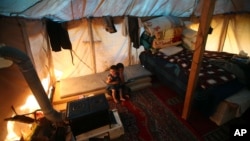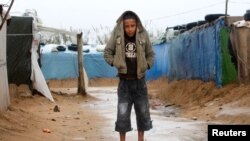BEIRUT, LEBANON —
Aid workers in Lebanon say they lack resources to cope with the swelling tide of refugees from Syria. Resentment is rising among many of these refugees now living destitute in Lebanon, since they expect more help from the international community. There also is growing anger among Lebanese who feel the influx of Syrians is threatening their jobs and the national economy.
Workers for the Lebanese aid group Ishraq al-Nour, funded by Islamic Relief in Britain and other charities, fear a possible "humanitarian disaster" in Lebanon when the battle for Damascus intensifies between Syrian rebels and government troops.
The aid workers say they cannot meet the needs of Syrians who already have fled to Lebanon, and they will be overwhelmed by any major new surge in refugees.
Anger is mounting among the refugees themselves, who are short of food and cannot find work. Lebanon's economy is distressed by the Syrian civil war and the lingering effects of recession. Tourism, a mainstay of the economy, has dropped off significantly and jobs are in short supply.
Growing issue
The United Nations says it has registered about 400,000 Syrians as refugees in Lebanon, but the Beirut government suspects there are many others - at least 200,000 and possibly as many as a half-million refugees who are not registered.
Those numbers contrast with Lebanon's entire population, which numbers about 4 million people.
Syrian Abed Razzak Khali fled to Lebanon from the suburbs of Damascus. A 35-year-old father of two young children, he cannot understand why his family is not getting more assistance. He gestured toward his 1-year-old daughter.
"When it comes to me I can be patient," he said. "I can wait. But this girl cannot wait for food. Okay, they bring us something, but what we need is much more. It is very hard."
Sitting in his tent at a camp in the Bekaa Valley, Khali said bitterly that he does not believe the aid agencies are doing all they can.
Khali said his tent and those around him were supplied by aid groups, "the NGOs" [nongovernmental organizations].
He added that "of course" those groups have additional resources "to cover the needs of the people, but it is not happening."
Omar Abdul Rahman of Ishraq al-Nour said aid workers were helping 265 refugee families a few months ago in the area around Bar Elias. Now, he says, more than 3,000 Syrian families there are seeking food, shelter and other assistance.
Abdul Rahman said resentment is rising among Lebanese, even those who initially reached out to help the Syrians. "Things changed later because of the big numbers of refugees who came here," he says. "Even the way [Lebanese] people look at them and treat them has changed."
Abdel Rahman explained that because the Lebanese have an economic crisis and many of them are jobless, over time they have had less to share with the Syrians. He said refugees even "began to replace Lebanese workers in some jobs because they were willing to take lower salaries."
Intermittent support
The aid worker said international aid is erratic. Donations arrive for a month, then "skip two or three months."
Lebanese politicians also fear the Sunni Muslims arriving from Syria could provoke a backlash from Lebanese Shi'ites and undermine the country's fragile multi-communal society.
Sunni Muslims make up the majority of those fighting to overthrow Syrian President Bashar al-Assad, a member of the minority Alawite sect, which has its roots in Shia Islam.
The Lebanese army already has had to break up clashes between Lebanese Sunni gunmen loyal to the Syrian rebels and pro-Assad Alawites or Shi'ites.
The U.N. high commissioner for refugees, António Guterres, warned last month that the Syrian crisis is an "existential threat" to Lebanon, and he called for greater international support for the fragile state.
Workers for the Lebanese aid group Ishraq al-Nour, funded by Islamic Relief in Britain and other charities, fear a possible "humanitarian disaster" in Lebanon when the battle for Damascus intensifies between Syrian rebels and government troops.
The aid workers say they cannot meet the needs of Syrians who already have fled to Lebanon, and they will be overwhelmed by any major new surge in refugees.
Anger is mounting among the refugees themselves, who are short of food and cannot find work. Lebanon's economy is distressed by the Syrian civil war and the lingering effects of recession. Tourism, a mainstay of the economy, has dropped off significantly and jobs are in short supply.
Growing issue
The United Nations says it has registered about 400,000 Syrians as refugees in Lebanon, but the Beirut government suspects there are many others - at least 200,000 and possibly as many as a half-million refugees who are not registered.
Those numbers contrast with Lebanon's entire population, which numbers about 4 million people.
Syrian Abed Razzak Khali fled to Lebanon from the suburbs of Damascus. A 35-year-old father of two young children, he cannot understand why his family is not getting more assistance. He gestured toward his 1-year-old daughter.
"When it comes to me I can be patient," he said. "I can wait. But this girl cannot wait for food. Okay, they bring us something, but what we need is much more. It is very hard."
Sitting in his tent at a camp in the Bekaa Valley, Khali said bitterly that he does not believe the aid agencies are doing all they can.
Khali said his tent and those around him were supplied by aid groups, "the NGOs" [nongovernmental organizations].
He added that "of course" those groups have additional resources "to cover the needs of the people, but it is not happening."
Omar Abdul Rahman of Ishraq al-Nour said aid workers were helping 265 refugee families a few months ago in the area around Bar Elias. Now, he says, more than 3,000 Syrian families there are seeking food, shelter and other assistance.
Abdul Rahman said resentment is rising among Lebanese, even those who initially reached out to help the Syrians. "Things changed later because of the big numbers of refugees who came here," he says. "Even the way [Lebanese] people look at them and treat them has changed."
Abdel Rahman explained that because the Lebanese have an economic crisis and many of them are jobless, over time they have had less to share with the Syrians. He said refugees even "began to replace Lebanese workers in some jobs because they were willing to take lower salaries."
Intermittent support
The aid worker said international aid is erratic. Donations arrive for a month, then "skip two or three months."
Lebanese politicians also fear the Sunni Muslims arriving from Syria could provoke a backlash from Lebanese Shi'ites and undermine the country's fragile multi-communal society.
Sunni Muslims make up the majority of those fighting to overthrow Syrian President Bashar al-Assad, a member of the minority Alawite sect, which has its roots in Shia Islam.
The Lebanese army already has had to break up clashes between Lebanese Sunni gunmen loyal to the Syrian rebels and pro-Assad Alawites or Shi'ites.
The U.N. high commissioner for refugees, António Guterres, warned last month that the Syrian crisis is an "existential threat" to Lebanon, and he called for greater international support for the fragile state.





